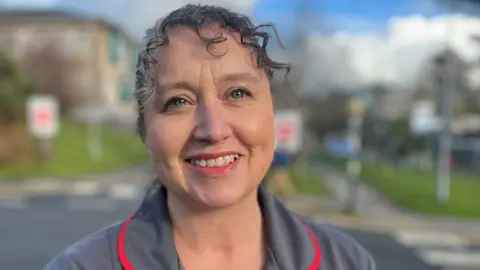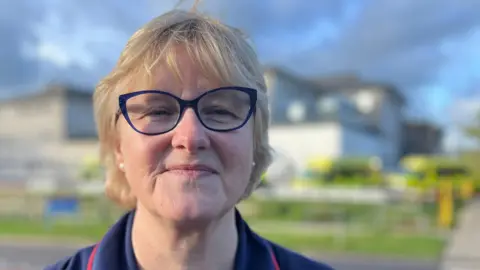Working together 'vital' in critical incident exit
 BBC
BBCCommunity-based staff and initiatives played a key role in relieving winter pressures, NHS bosses say.
A critical incident was declared for Cornwall's NHS services on 3 January, which then ended on the evening of 8 January.
Since September, community-based staff have been present in the emergency department and other wards so community nurses can help hospital colleagues assess patients and get them home sooner.
Up to 15 people a day are being admitted to a "virtual ward" when they get home. The service allows medical staff to monitor the discharged patients remotely and frees up beds at Royal Cornwall Hospital for seriously ill people.
'Made some headway'
Lucy Clement, the associate director for community nursing at the Cornwall Partnership NHS Foundation Trust, said "navigating the system" could be "very, very difficult" for hospital staff.
"I think that the new ways of working have been absolutely vital in turning this critical incident around sooner this year," she said.
"We've still got a long way to go, but I do believe that we've made some headway here.
"As soon as people come through the front door, we're assessing their needs and trying to turn them around, back into the community services much sooner."

Julie Mackinnon, the trust's operational lead for admission avoidance, said the team also worked with patients who had been admitted to make sure beds were available "for the right people at the right time".
"What we want to make sure is that we haven't admitted somebody who doesn't necessarily need to be in a hospital bed for all sorts of reasons," she said.
The team directs patients to same day emergency care units in community hospitals and also to virtual wards to monitor them.
Bosses said the virtual wards gave people the equipment and care they needed in their own homes.
NHS bosses said services remained under serious pressure in Cornwall, with people urged to avoid hospital unless it was a life or limb threatening situation.
Follow BBC Cornwall on X, Facebook and Instagram. Send your story ideas to [email protected].
